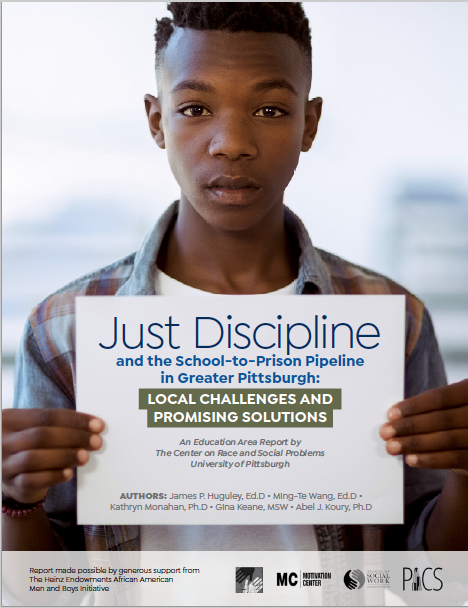JAMES P. HUGULEY AND RACHELLE H. HAYNIK
by James P. Huguley and Rachelle H. Haynik, Center on Race and Social Problems, University of Pittsburgh School of Social Work
The school-to-prison pipeline holds consequences for the academic, criminal justice and mental health needs of African American youth. Since 2017, the Just Discipline Project (JDP) has been working in Pittsburgh-area schools to decrease the impact of the school-to-prison pipeline using a model of whole-school cultural change. The model includes placing a restorative practice coordinator in every partner school, training teachers and administrators in using restorative and relational approaches to school climate and empowering student leaders to become changemakers in the face of challenges to their well-being.

JDP represents the middle child cohort intervention under The Pittsburgh Study. Through our transformational model, school communities seek to understand students deeply and to have a keen sense of the assets and challenges that are present in students’ lives. These empathetic insights defuse many misunderstandings and biases before they escalate into conflict. When problems do occur, we build on relational capital to respond in ways that restore community. Under our model, struggling students are often recognized for their fullest potential, with many entering our Leaders in Training program (L.I.T. Leaders) to maximize their gifts. Through this aspect of the work, children not only benefit themselves, but they are trained to use restorative practices to mediate conflicts in ways that help their peers thrive, as well. Teachers also play a major role in this school climate transformation. In classrooms each week, teachers hold community circles that allow students to better relate to each other, while giving teachers the opportunity to learn more about their students’ lives and to share about their own. Moreover, for students who need more intensive support—like the ear of a social worker, school psychiatrist or other professional—the restorative practice coordinator is a trusted adult in the school building full-time, to whom students feel comfortable contacting in times of need. We also are launching a trauma-responsive intervention this fall for students facing ongoing adversity outside of school.
The model’s results to date have been quite promising. In the first two school years of the program, the pilot school saw a 22% decrease in suspensions and a 30% decrease in referrals. Academic achievement increased in math, science and language arts, and students surveyed said they felt safer and that they had more of a voice in the school. Of the teachers surveyed, 91% said they would like the restorative practices to continue. This fall, staff from JDP will be in at least ten schools in Allegheny County, building on past successes.

Restorative Justice and culture-building programming started in the Pittsburgh Public Schools in the spring of 2017 and has continued since that time. Evaluation of the work is ongoing.